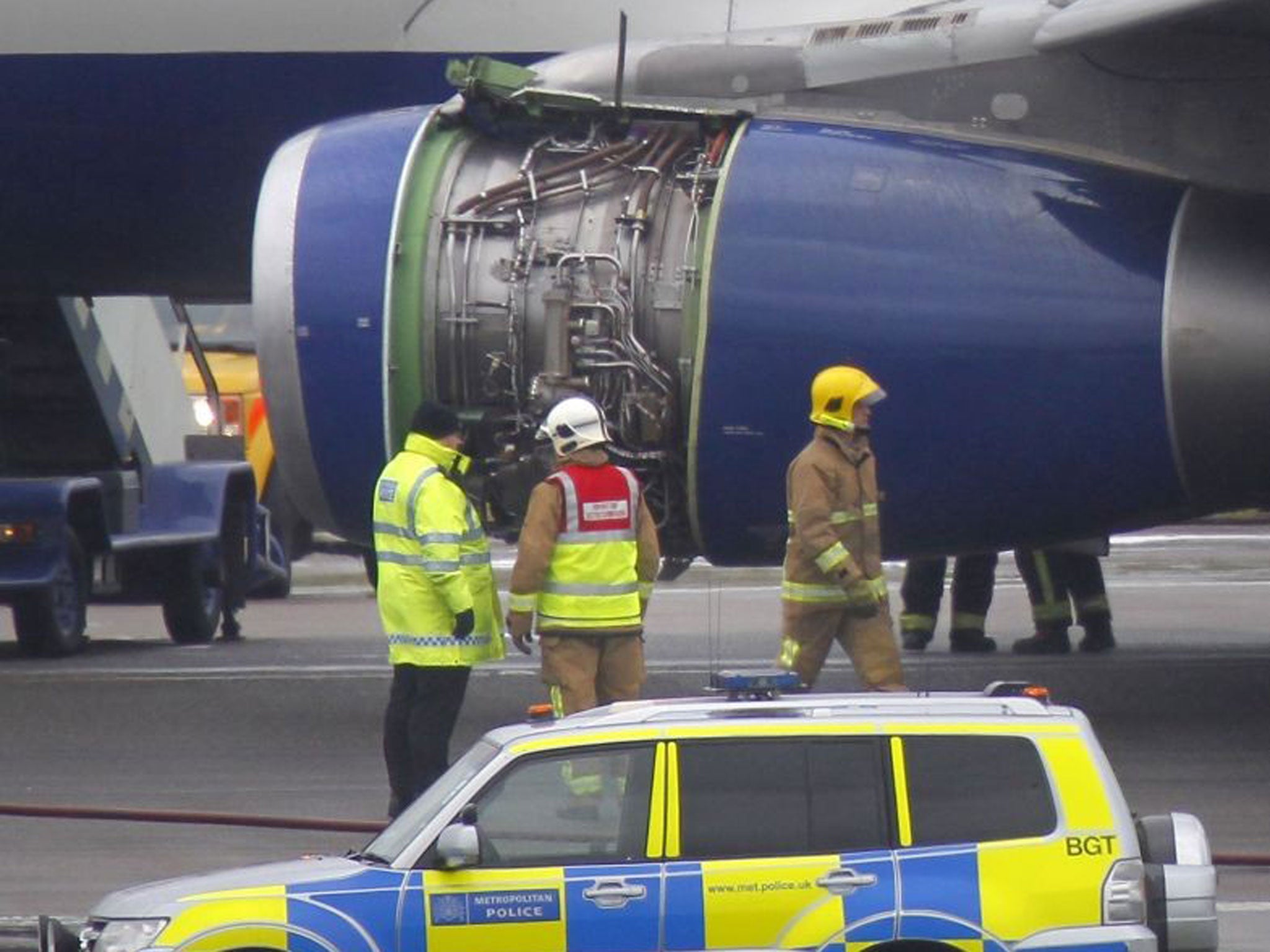Failure of 'walk-around inspection' blamed for British Airways' Heathrow emergency landing after engine caught fire
Airline hopes to avoid £10m compensation bill

Your support helps us to tell the story
From reproductive rights to climate change to Big Tech, The Independent is on the ground when the story is developing. Whether it's investigating the financials of Elon Musk's pro-Trump PAC or producing our latest documentary, 'The A Word', which shines a light on the American women fighting for reproductive rights, we know how important it is to parse out the facts from the messaging.
At such a critical moment in US history, we need reporters on the ground. Your donation allows us to keep sending journalists to speak to both sides of the story.
The Independent is trusted by Americans across the entire political spectrum. And unlike many other quality news outlets, we choose not to lock Americans out of our reporting and analysis with paywalls. We believe quality journalism should be available to everyone, paid for by those who can afford it.
Your support makes all the difference.In 21 unemotional words, safety officials explained why a stricken British Airways jet spent half an hour flying over greater London, during which one engine caught fire: “The fan cowl doors on both engines were left unlatched during maintenance and this was not identified prior to aircraft departure”.
Just a week after the BA Airbus A319 made an emergency landing at Heathrow, the Air Accidents Investigations Branch (AAIB) rushed out a report urging airline ground staff and pilots to check that the engine panels are properly closed before departure
The AAIB stresses that the sole objective of its investigation is to prevent future accidents, not to apportion blame. But the interim report indicates that engineers failed properly to close the panels; that the pilots did not spot the error during the “walk-around” inspection; and the problem was also missed by the push-back crew.
On Friday 24 May, flight BA762 took off as normal from Heathrow’s southern runway, destination Oslo. The AAIB report says that the captain felt “a slight bump” as the aircraft became airborne. As the jet climbed, air-traffic controllers told the crew that their aircraft had left debris on the runway – and cabin crew, alerted by passengers, told the pilots that the panels were missing.
The fan cowl doors, weighing 40kg each, caused substantial damage as they detached. One of the aircraft’s three hydraulic systems was lost, control of engine thrust was degraded, and a “significant fuel leak” started. Initially the crew declared a “Pan”, signalling a serious problem without imminent danger, and prepared to return to Heathrow.
During the approach, the right engine caught fire. The crew declared a “Mayday” and shut down the engine. Despite both fire extinguishers being discharged the fire was not put out until the aircraft landed.
The problem of engine panels falling off Airbus narrow-bodied jets was highlighted last July in the manufacturer’s Safety First magazine. The article, “Preventing Fan Cowl Door Loss,” revealed that panels had fallen off no fewer than 32 times, and that: “This type of damage represents a major hazard”.
Airbus stresses that the pilot conducting a walk-around “must be positioned on the side of the engine and crouch” to make sure the panel was properly closed.
British Airways’ chief executive, Keith Williams, said the airline had already adopted the AAIB recommendation. He commended “the professionalism of the flight crew for the safe landing of the plane and the cabin crew and pilots for its safe evacuation”.
Captain Mark Searle, chairman of the British Airline Pilots' Association, praised the recovery of the aircraft as “a terrific piece of airmanship performed by two very skilled pilots”.
The Transport Secretary, Patrick McLoughlin, said airlines should “act immediately to take the appropriate safety action and ensure that all lessons are learnt from what has happened”.
In the snarl-up at Heathrow that followed the emergency, almost 200 flights were cancelled - the majority of them BA arrivals and departures. If the final report confirms shortcomings by BA staff, it could lead to a surge of claims from an estimated 25,000 passengers whose flights were cancelled as a result of the incident. European passengers’ rights legislation, known as EU261, obliges airlines to pay between €250 and €600 to such passengers unless the carrier can demonstrate the disruption was the result of “extraordinary circumstances”.
If passengers on heavily delayed long-haul flights are included, BA’s exposure to compensation claims could total £10m.
The airline said: “We do not believe we are liable for further EU261 compensation payments as the closure or restriction of airspace, which lead to the cancellations and delays, is defined as an extraordinary circumstance.”
Join our commenting forum
Join thought-provoking conversations, follow other Independent readers and see their replies
Comments